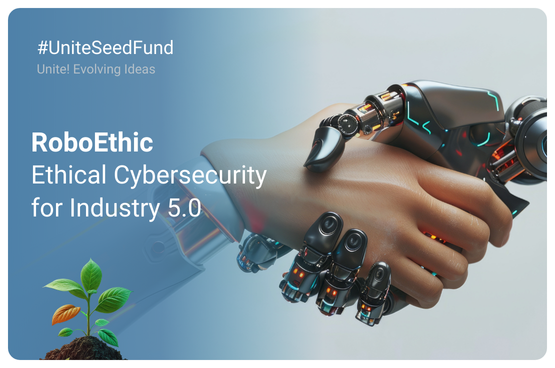
RoboEthic: Facing the challenges of Industry 5.0 through cross-disciplinary education
This seed funded project, a collaborative effort among four Unite! partner universities, aims to prepare the next generation of professionals with a robust, interdisciplinary education to face the challenges of Industry 5.0.
Ongoing advancements in artificial intelligence (AI), machine learning (ML), and the Internet of Things (IoT) are reshaping society and driving new business models with a focus on human-centric approaches, known as Industry 5.0. while a notable skills gap emerges: engineering students often lack socio-technological and business development skills, while social science and business students often lack technological understanding. To fully comprehend the socio-technological implications and innovate future systems, an interdisciplinary approach is essential.
The seed funded “RoboEthic” project with team members from TU Graz, Aalto University, Grenoble INP-UGA and Politecnico di Torino aims to facilitate cross-domain knowledge transfer among social, engineering, and business students through a hybrid learning model. The project’s curriculum will include course modules that focus on socio-technological implications, dependability, innovation management, and industrialisation. This comprehensive approach combines interactive teaching methods, facilitation workshops, and evaluations in simulated industry environments. The key goals include:
- Comprehensive curriculum development: Creating an extensive curriculum, training materials, and an online teaching platform for seamless integration into the partner universities' study programs.
- Cross-domain knowledge transfer: Enabling the transfer of knowledge between students of social sciences, engineering, and business.
- Hybrid learning model and interactive teaching methods: Establishing a hybrid learning approach that combines online training with intensive on-site courses using the Unite! Metacampus to provide immersive learning experiences. Interactive teaching methods, workshops and further group activities serve to evaluate and validate concepts in simulated industry-relevant environments.
- Specialised course modules: Developing course modules focusing on socio-technological impacts, reliability and trust factors, innovation management, and industrialisation conceptualisation.
The project will utilize the complementary expertise and resources of each partner institution to develop and implement a comprehensive interdisciplinary curriculum for students. It not only aims to fill the current educational gaps for industry 5.0 but also to foster innovation and collaboration across disciplines, ensuring a holistic approach to future technological advancements.
Stay tuned for more updates on the progress and outcomes of the RoboEthic project, as we strive to empower students with the knowledge and skills to thrive in the evolving landscape of Industry 5.0.
Practical information
Help us shape the future and share your insights with the team!
